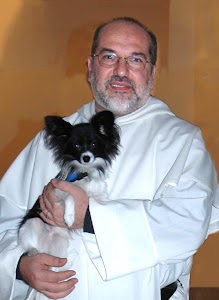 Major Lori Kibler on left ~Warden Robert Shannon on right ~ trainers and pups
Major Lori Kibler on left ~Warden Robert Shannon on right ~ trainers and pupsThis is a NEW HORIZONS SERVICE DOG program in partnership with the Florida Department of Corrections where the inmates are doing a public service by helping to train future service dogs to help the disabled.
There are many disabled who waiting for a service dog to assist them and with the inmates help, more dogs are able to be ready to partner with someone who needs a dog to assist them.
Patty Armfield, an experienced dog trainer, comes twice a week to the prison to help the inmates learn dog training skills. She is teaching all aspects of dog care, which could lead further to employment once released. Her work is very much appreciated.
We need many items for this program: dog grooming supplies, crates, towels, dog toys, gift cards to buy dog food, plastic dog gates, leashes. A list of items can be obtained by contacting Janet Severt at New Horizons ~ 386 456-0408
 JANET, PATTY AND THE TRAINERS
JANET, PATTY AND THE TRAINERS

LEARNING HOW TO GROOM THEIR PUPS




WATCH THE SLIDE SHOW OF NEW HORIZONS SERVICE DOGS AND THEIR PARTNERS
The Prison Dog Project transforms the lives of many people
February 14, 10:09 PM ·
The Prison Dog Project touches many lives
The Prison Dog Project is a program that brings dogs with unsocial characteristics that render them inadaptable into correctional facilities to be trained by inmates. Started in 1981 by Dominican nun Sister Pauline Quinn, the program has been adopted throughout and outside the U.S.
One of the reasons the program has been successful is it transforms the lives of many people and animals at once.
It touches the lives of prison inmates and guards, people with disabilities, society as a whole and the dogs. Animals form a natural bridge between people that has affected the relationships between prison guards and inmates, inmates and the public and people with disabilities and society. Animals, especially dogs, break the ice and foster communication and connection.
In the project, prisoners are responsible for the care and training of dogs to be good citizens or for service for training schools, people with disabilities or law enforcement. Prisoners learn skills such as dog training and grooming and earn money providing services to private dog owners. This income is used to train service dogs that go to people with disabilities free of charge. Some inmates become so expert that potential employers want to hire them upon release.
The presence of dogs in prison has had therapeutic effects relieving tensions and reducing violence. The relationship between prison guards and prisoners is improved. The unconditional love from dogs has helped prisoners access long buried feelings and armored hearts. Prisoners speak of the reward of knowing they’re preparing the dog so it can pass its restorative effect on to a future owner. Prisoners get in touch with a sense of meaning and purpose doing something that regenerates them while also helping others.
The Prison Dog Project decreases the waiting list for assistance dogs and helps people with disabilities get dogs faster, opening up accessibility and social contact. The dogs also help society connect with the disability community.
The project helps society by redeeming and rehabilitating prisoners enabling them to become happier, healthier members of society. The prisoners learn or reclaim responsibility, tolerance, patience and other qualities beneficial to society.
The project saves the lives of dogs that would otherwise be euthanized. They are given a second chance by being trained to be good citizens or for service and returned to society.
The Prison Dog Project relies primarily on donations and supplies from the public in order to continue and expand.
Media Statements
Minister for Police, Corrective Services and Sport
The Honourable Judy Spence MP
Tuesday, April 29, 2008
First 'Pups in Prison' graduates to help disabled:

Spence Corrective Services Minister Judy Spence with assistance dog Taylor, along with Darling Downs Correctional Centre General Manager Andrew Pike, centre, and Assistance Dogs Australia Chief Executive Officer Richard LordThe first assistance dogs to participate in Queensland's innovative Pups in Prison program have today graduated from their 14 month training course at Darling Downs Correctional Centre.
Corrective Services Minister Judy Spence presented black Labradors siblings Toomba and Truman and Golden Retrievers siblings Topaz and Taylor, to Assistance Dogs Australia (ADA) Chief Executive Officer Richard Lord, during a ceremony on the Speaker's Green at Parliament House.
Ms Spence said: "This program is a Queensland-first that brings puppies and prisoners together as part of a rehabilitation partnership between Assistance Dogs Australia and Queensland Corrective Services.
"These dogs have undergone 14 months basic training and socialising with prisoners at the Darling Downs Correctional Centre (DDCC) near Toowoomba, west of Brisbane.
"They will now be returned to ADA for a six month intensive training program before being matched to people with physical disabilities to enhance the person's quality of life and improve their level of independence.
"The dogs will eventually be able to turn light switches off and on, press pedestrian crossing buttons and pick up and retrieve items - tasks which people in wheelchairs find extremely difficult.
"This government is pleased to be part of an initiative that is making a real difference to lives of Queenslanders in need."
Ms Spence said the partnership with Assistance Dogs Australia is a prime example of how Queensland Corrective Services works with community organisations to provide prisoners with new opportunities for rehabilitation while giving something worthwhile back to the community.
Assistance dog showing obedience at the graduation day"Pups in Prison has provided prisoners with a positive experience, establishing new levels of responsibility, self-esteem and communication skills, while also developing patience, compassion and cooperation," Ms Spence said.
"Assistance Dogs Australia does a fantastic job in their work training companion dogs for people with disabilities and it is a pleasure to be involved in the important role they play in our community."
Assistance Dogs Australia CEO Richard Lord said the Pups in Prison program has been a huge success.
"We are very excited to see the inaugural graduation from the Darling Downs Correctional Centre," Mr Lord said.
"The pups look fantastic and are very well trained. The program has united the officers, prisoners and community volunteers whose combined efforts to train and socialise the pups has been outstanding.
"These remarkable dogs will change for the better the lives of young people who have suffered from developmental disabilities or quadriplegia as a result of traumatic accidents.
"We look forward to continuing the program with Queensland Corrective Services," Mr Lord said.
Ms Spence said the program has also provided significant learning opportunities for staff.
"Staff at Darling Downs and the volunteer obedience trainers have done a great job in developing the program," Ms Spence said.
Assistance dogs demonstrate their training "I know they are now looking forward to the arrival of the second group of puppies, due to start training at the centre in July."
 Assistance dog showing obedience at the graduation day
Assistance dog showing obedience at the graduation day

Assistance dogs demonstrate their training
Media Contact: 3239 6172





2.jpg)

